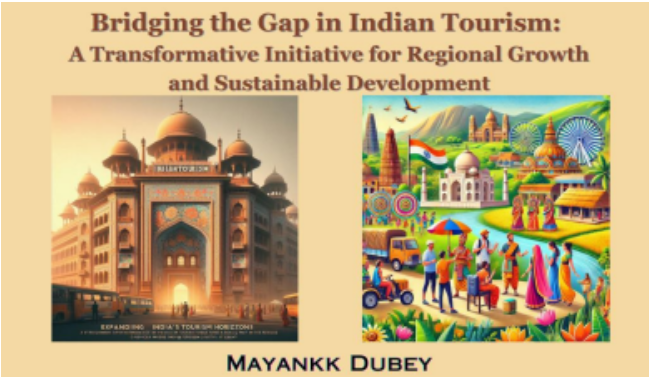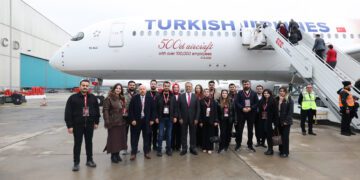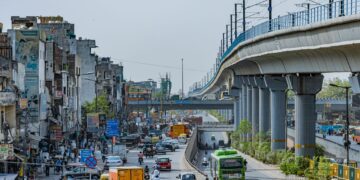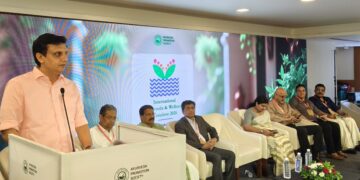
This strategic move, implemented in collaboration with the Indian Institute of Tourism and Travel Management (IITTM), is designed to expand the Ministry’s reach, improve regional collaboration, and deliver on the vision of inclusive tourism growth. By enhancing its regional presence, the Ministry is empowering these managers to engage effectively with local stakeholders, state tourism boards, and community members to foster a vibrant tourism ecosystem nationwide.
Now, two years into this initiative, it has become a cornerstone of India’s tourism strategy, helping to improve regional collaboration, elevate local stakeholders, and promote inclusive growth. This initiative aligns seamlessly with the government’s vision of Viksit Bharat 2047, a vision that aims to create a developed India marked by economic prosperity, social progress, environmental sustainability, and good governance.
Aligning with the Vision 2047: Viksit Bharat and Incredible India The Viksit Bharat 2047 vision aims to position India as a developed nation by its centenary of independence, with tourism playing a key role in achieving this goal. The Ministry of Tourism’s decision to appoint managers and assistant managers reflects a broader strategy of fostering growth in the tourism sector while ensuring environmental sustainability and social inclusivity. This initiative is designed to directly contribute to the vision of Viksit Bharat, where the benefits of tourism are shared equitably across the nation.
The current government, under Modi government 3.0, has made Incredible India tourism a central priority, aiming to place India at the forefront of the global tourism industry. The ‘Tourism in Mission Mode’ initiative, which was part of a brainstorming session organized by the Union Ministry of Tourism in March 2023, highlighted the sector’s immense potential. The Federation of Associations in Indian Tourism and Hospitality (FAITH) projected that by 2047, the Indian tourism sector could transform into a $3 trillion economy, capable of generating 200 million jobs and attracting 100 million foreign tourists while hosting over 20 billion domestic tourists.
To realize this ambitious vision, tourism must be treated as a national priority, supported by sustainable planning, policy reform, and investment in local capacities. The appointment of these regional managers is a critical step in ensuring that the benefits of tourism reach every part of India and that the growth of the sector aligns with the broader goals of economic and social development.
Sustainable Tourism: A Catalyst for National Development
Recognizing the power of tourism to drive economic and social transformation, the government has placed “Incredible India” at the forefront of its national development agenda. The goal is to create a thriving tourism sector that contributes significantly to India’s economic growth and job creation, while also promoting sustainable and responsible tourism practices.
Strengthening Tourism through Local Representation
The cornerstone of this initiative is to establish a direct local presence in areas that were previously underserved or lacked adequate tourism infrastructure. By appointing managers and assistant managers in these regions, the Ministry is strengthening its ability to engage with local stakeholders, state tourism boards, and community organizations. This decentralized approach allows the Ministry to understand and respond to the unique challenges and opportunities each region presents.
The initiative complements the government’s new domestic tourism policy, which seeks to promote destination tourism over theme-based circuits. This policy also highlights the importance of the “Vocal for Local” movement, which calls for boosting local businesses and cultural heritage as a means to elevate tourism and create new job opportunities. The appointment of local representatives in the tourism sector is a direct response to this vision, ensuring that regional tourism development strategies align with national objectives.
With dedicated representatives in each region, local communities are better positioned to tap into national tourism initiatives. The engagement of these managers ensures cohesive policy implementation, with regional stakeholders involved in the process, leading to better coordination and enhanced impact on local tourism.
This initiative has been overwhelmingly welcomed by state tourism departments and other key stakeholders, who view it as a much-needed move to bridge the existing gaps in regional tourism development. By ensuring that local needs and resources are taken into account, the initiative has fostered a sense of unity between the central and regional tourism bodies, allowing for more tailored, impactful solutions for growth.
Supporting Ongoing Ministry Key Initiatives Through Local Presence The Ministry of Tourism’s Managership initiative also plays a vital role in supporting several national schemes and initiatives designed to boost tourism, promote cultural preservation, and generate employment. These initiatives go hand in hand with the broader goals of the Viksit Bharat vision, focusing on sustainability, job creation, and heritage conservation.
- Swadesh Darshan 2.0 (SD2.0): This revised version of the Swadesh Darshan scheme seeks to develop sustainable, responsible tourism destinations across India. By taking a destination-based approach, this program integrates infrastructure development, service improvements, and capacity-building for local communities. It not only improves the quality of tourism infrastructure but also ensures that the local economy benefits from the growth of the tourism sector.
- PRASHAD Scheme: The Pilgrimage Rejuvenation and Spiritual Heritage Augmentation Drive supports the enhancement of pilgrimage sites, improving infrastructure, amenities, and facilities to attract both domestic and international visitors. Local managers help implement this scheme at regional levels, ensuring that the heritage of pilgrimage sites is preserved while also improving the visitor experience.
- Azadi Ka Amrit Mahotsav (AKAM): Celebrating India’s 75 years of independence, this initiative promotes national pride through cultural events, heritage preservation, and local tourism. It offers a platform for communities to engage in promoting their local cultures and traditions, supported by the regional managers who help organize events and programs.
- Ek Bharat Shreshtha Bharat (EBSB): This initiative promotes unity in diversity by facilitating cultural exchange programs between different states and union territories. Managers and assistant managers organize local events that bring people together, enhancing cultural understanding while boosting domestic tourism.
- Dekho Apna Desh (DAD): This campaign encourages Indian citizens to explore their own country. Regional representatives help promote lesser known tourist destinations, educating citizens on the hidden gems within their own regions, thus driving local tourism and supporting economic development.
- Vibrant Village Program (VVP): Targeting border areas, this program focuses on developing these regions as tourism hubs, improving infrastructure, creating jobs, and preventing depopulation. Managers in these areas play a pivotal role in ensuring the success of this program by connecting local communities to the broader tourism network.
- Swachhata Pakhwada (SBM): Under the Swachh Bharat Mission, this program encourages cleanliness drives and responsible tourism practices. Regional representatives organize and oversee campaigns to ensure that popular tourist destinations maintain cleanliness, which is integral to the sustainability of tourism.
- Incredible India Tourist Facilitator Certification (IITFC): Through this certification program, individuals in tourism-related fields are trained to improve the visitor experience. Managers facilitate local participation, ensuring that skilled tourism professionals are available across the country.
- Paryatan Mitra and Paryatan Didi Initiatives: These programs focus on empowering youth and women through skill development and training in hospitality and tourism management, ensuring that these groups benefit directly from the growing sector.
– 10.Capacity Building Initiatives: The Hunar Se Rozgar Tak (HSRT) program trains youth in various skills related to hospitality, customer service, and tourism management, creating a skilled workforce that can support the expanding tourism sector.
11.Digital Platforms: The Ministry has launched various digital initiatives like the Nidhi portal, Utsav portal, and the Incredible India website to enhance India’s digital presence and attract tourists. Regional managers contribute by updating these platforms with relevant regional information, ensuring that tourists have access to current and accurate details.
12.Market Research and Tourist Footfall Analysis: Managers help collect data on tourist arrivals and trends, contributing to more targeted marketing and promotional strategies.
13.Ek Ped Maa Ke Naam (EPMKN): This environmental initiative encourages travelers to plant a tree in honor of their mothers. Local representatives organize tree-planting drives, promoting eco-friendly tourism practices and supporting the sustainability agenda.
Promoting Awareness and Job Creation
A central aspect of this initiative is raising awareness of the employment opportunities in the tourism sector. The appointed managers help educate local communities on various skill development and job creation programs, such as Incredible India Tourist Facilitator Certification, Hunar Se Rozgar Tak, and the Paryatan Mitra and Didi initiatives. By connecting locals to these opportunities, they create pathways for sustainable employment and economic independence, empowering individuals to actively participate in India’s tourism growth story.
Engaging Communities in Sustainable Tourism and Cultural Heritage Sustainability remains a central focus of the Ministry’s tourism vision, and local representatives play a critical role in fostering responsible tourism practices. They organize campaigns to raise awareness about the importance of eco friendly tourism, maintaining cleanliness, and preserving cultural heritage. Through initiatives such as the Yuva Tourism Clubs and Azadi Ka Amrit Mahotsav, young people are encouraged to actively engage with India’s diverse
cultural heritage, preserving it for future generations while learning about sustainable tourism practices.
Conclusion: A Visionary Approach for a Stronger Tourism Sector The Ministry of Tourism’s decision to appoint Managers and Assistant Managers across the country marks a critical turning point in India’s tourism development. Now, two years into this initiative, it has shown immense promise in promoting inclusive growth, job creation, and cultural preservation. By empowering local communities, providing skills training, and aligning regional tourism with national goals, these representatives are helping realize the Vision 2047 of a prosperous, sustainable, and globally competitive India.
Through their efforts, tourism is not only becoming a tool for economic growth, but also an avenue for fostering social cohesion, environmental sustainability, and cultural pride across India. The support and engagement from state tourism departments and other stakeholders have further solidified the importance of this initiative, positioning it as a key enabler in the government’s strategy to achieve a Viksit Bharat by 2047. As this visionary initiative continues to unfold, it promises to transform India’s tourism landscape, ensuring that the benefits of this thriving sector are shared by all, from the bustling cities to the farthest rural corners.
Follow BOTT on LinkedIn, Facebook, Twitter & Instagram
Subscribe BOTT Channels on WhatsApp & Telegram to receive real time updates



































